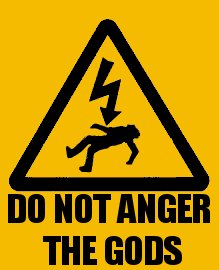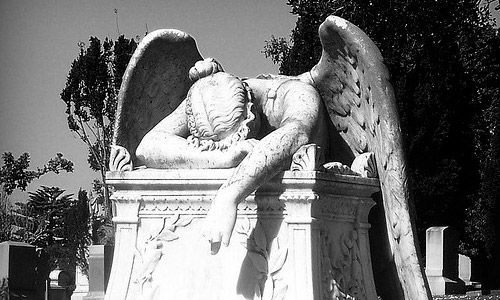I am really excited about the podcast I am publishing this Thursday. We will be looking at Genesis 3:8-10 which is where Adam and Eve hide from God after eating fruit from the Tree of the Knowledge of Good and Evil.
If you haven’t been listening to my podcast, make sure you don’t miss this one. It reveals something crucial about God. Something you don’t want to miss. Go subscribe now, and you will get it automatically on Thursday…
Among other things, I talk about how God calls out in Genesis 3:10, “Adam, where are you?”
This is the question of God throughout all of human history.
Lots of people say that the Bible is an account of man in search of God. I see it differently. I see it as an account of God in search of man.
God did not leave us. We left Him. The division that exists between God and man is completely one-sided (our side). We abandoned Him; He did not abandon us.
 The death of Jesus on the cross was not to reconcile an angry God to sinful and rebellious humanity. No, the death of Jesus on the cross was completely one-sided; it was to reconcile a fearful humanity to a loving God. God was in Jesus reconciling the world to Himself (2 Cor 5:19); not the other way around.
The death of Jesus on the cross was not to reconcile an angry God to sinful and rebellious humanity. No, the death of Jesus on the cross was completely one-sided; it was to reconcile a fearful humanity to a loving God. God was in Jesus reconciling the world to Himself (2 Cor 5:19); not the other way around.
Scripture is about what God is doing to rebuild that relationship and reconnect with us.
One of the other places we see this is in Luke 15, with the story of the shepherd who goes in search for a lost sheep, a woman who upends her house searching for a lost coin, and loving father who pines away looking down the road for his lost son (and when he sees his son returning from a long way off, he runs to meet him).
I also believe, by the way, that the Prodigal Son is Adam (and all of us in Adam). When the younger son goes and asks his father for his inheritance, this is Adam eating the fruit from the Tree of the Knowledge of Good and Evil. I believe that the wisdom that came from that tree is something God wanted to slowly impart to humanity over time in the midst of their relationship. But Adam took a short cut. He wanted the wisdom “Now” just like the Prodigal Son wanted his inheritance “Now.”
Anyway, if you haven’t subscribed to the Podcast yet, this would be a great time! Or if you have subscribed, but have missed several episodes, this would be a great time to pick it back up.
Someone who has been listening their way through the episodes recently emailed me and said that the podcast was “Genesis in a way I have NEVER heard it before!” That’s a good way of describing it. I enjoy teaching it, and I know you will enjoy learning along with me.
That might be an overstatement. Not all people enjoy my podcast. But even if you don’t enjoy it, at least you will be challenged …
Anyway, what do you think of this idea about God in search of man. It is not that He “lost” us. He knows right where we are, just as He knew right where Adam was. But God plays Hide and Seek in the Garden with Adam just as He plays Hide and Seek with us in our lives.
Why?
You’ll have to listen to the podcast to find out…





 They are so scared, they cannot eat, they cannot sleep, they cannot think. They tell me about physical problems, emotional problems, relational problems, and all sorts of other problems they are experiencing because they are so afraid that God is out to get them because of something bad they said or thought about God.
They are so scared, they cannot eat, they cannot sleep, they cannot think. They tell me about physical problems, emotional problems, relational problems, and all sorts of other problems they are experiencing because they are so afraid that God is out to get them because of something bad they said or thought about God.



 … By the way, this entire story was a parable.
… By the way, this entire story was a parable.
 One of the reasons Jesus came was to reveal God to us.
One of the reasons Jesus came was to reveal God to us.

 When the son returns, the father has clearly been watching for his return, for when the son is still a long way off, the father sees him coming, and runs to meet him on the road. For a wealthy middle-eastern man, any sort of running was considered shameful, but to run to meet a son who had betrayed you was extremely shameful. Nevertheless, due to the father’s great love for his son, he runs to meet him, and not only that, but gives him a warm welcome and throws a party for him.
When the son returns, the father has clearly been watching for his return, for when the son is still a long way off, the father sees him coming, and runs to meet him on the road. For a wealthy middle-eastern man, any sort of running was considered shameful, but to run to meet a son who had betrayed you was extremely shameful. Nevertheless, due to the father’s great love for his son, he runs to meet him, and not only that, but gives him a warm welcome and throws a party for him. How can a God who says "Love your enemies" (Matthew 5:44) be the same God who instructs His people in the Old Testament to kill their enemies?
How can a God who says "Love your enemies" (Matthew 5:44) be the same God who instructs His people in the Old Testament to kill their enemies?


